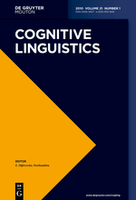
COGNITIVE LINGUISTICS
Scope & Guideline
Advancing Understanding of Cognitive Connections.
Introduction
Aims and Scopes
- Cognitive Processes in Language:
Investigating how cognitive mechanisms influence language use, including perception, memory, and attention. - Construction Grammar:
Focusing on the role of constructions—conventionalized forms of language—in understanding linguistic structure and meaning. - Multimodal Communication:
Examining the interplay between verbal and non-verbal elements in communication, including gestures, facial expressions, and other modalities. - Cross-Linguistic Studies:
Conducting comparative analyses of linguistic phenomena across different languages to uncover universal cognitive principles. - Event Integration and Representation:
Exploring how events are linguistically encoded and understood, particularly in complex predicate structures. - Semantic Networks and Meaning Construction:
Analyzing the dynamic nature of meaning through semantic networks and how they inform language processing and use.
Trending and Emerging
- Usage-Based Approaches:
There is a notable increase in studies employing usage-based methodologies, emphasizing how language is shaped by real-world usage and cognitive processes. - Cognitive Neuroscience Integration:
Research that incorporates findings from cognitive neuroscience to better understand language processing and representation is gaining traction. - Interdisciplinary Connections:
A growing trend towards interdisciplinary research that combines insights from psychology, sociology, and anthropology with cognitive linguistics is evident. - Metaphor and Meaning:
Investigations into metaphorical language and its role in shaping thought and communication are increasingly prominent, reflecting ongoing interest in how metaphor influences cognition. - Bilingualism and Multilingualism:
Emerging studies on bilingual and multilingual processing highlight the cognitive complexities involved in using multiple languages, showcasing the journal's focus on diverse linguistic contexts.
Declining or Waning
- Traditional Syntax:
There appears to be a waning interest in purely syntactic analyses devoid of cognitive considerations, as researchers increasingly integrate cognitive insights into syntactic studies. - Chomskyan Linguistic Theories:
Research grounded solely in Chomskyan frameworks is less prevalent, as cognitive linguistics emphasizes usage-based and experiential approaches over purely formalist perspectives. - Static Models of Language:
The reliance on static models of language representation is decreasing, with a growing preference for dynamic and context-sensitive models that account for language variability.
Similar Journals
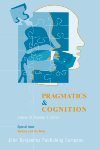
Pragmatics & Cognition
Advancing Understanding of Contextual CommunicationPragmatics & Cognition, published by John Benjamins Publishing Co, is an esteemed journal that serves as a cross-disciplinary platform for the study of language, cognition, and context-dependent communication. With its ISSN 0929-0907 and E-ISSN 1569-9943, the journal has established a notable reputation since its inception in 1993, although its coverage spans various fields from behavioral neuroscience to linguistics and philosophy. Recognized for its scholarly contributions, it holds impressive Scopus rankings, significantly within Linguistics and Language, where it ranks in the 63rd percentile among peers. Although it currently maintains a Q4 designation in Behavioral Neuroscience and a Q1 in Linguistics and Language as of 2023, the journal appeals to a diverse audience addressing the intricate relationships between language use and cognitive processes. As researchers and academics navigate this evolving landscape, Pragmatics & Cognition remains pivotal in fostering essential dialogues and advancing knowledge in the interdisciplinary field, providing rich content that is both insightful and relevant.
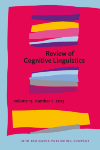
Review of Cognitive Linguistics
Enhancing Understanding of Language Through Cognitive LensesThe Review of Cognitive Linguistics, published by John Benjamins Publishing Co, is a premier academic journal dedicated to the exploration of cognitive approaches to linguistics. With an ISSN of 1877-9751 and E-ISSN 1877-976X, this journal provides a critical platform for researchers and professionals to disseminate their findings in the rapidly evolving fields of linguistics and language, alongside developmental and educational psychology. Hailing from the Netherlands, the journal boasts impressive standing within the academic community, as indicated by its 2023 Q1 ranking in Linguistics and Language and Q3 in Developmental and Educational Psychology. Additionally, its Scopus rankings reflect a strong position within the arts and humanities and social sciences categories. While currently operating under a traditional access model, this journal actively contributes to the overarching discourse within cognitive linguistics, and is a vital resource for those aiming to deepen their understanding of the intricate link between language and cognition. Researchers, educators, and students are encouraged to engage with the rich body of articles spanning its convergence years from 2010 to 2024, making it an essential read for those at the forefront of these interdisciplinary studies.
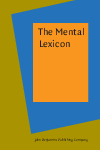
Mental Lexicon
Illuminating the Pathways of Language and CognitionMental Lexicon is a leading academic journal published by JOHN BENJAMINS PUBLISHING CO that spans significant interdisciplinary terrains including Cognitive Neuroscience and Linguistics. Since its inception in 2006, the journal has gained a prestigious reputation, currently holding a Q1 tier in Linguistics and Language and a Q3 rating in Cognitive Neuroscience based on 2023 categorizations. With impressive Scopus rankings—247 out of 1088 in Language and Linguistics and 94 out of 115 in Cognitive Neuroscience—it serves as a critical platform for the dissemination of innovative research and theoretical advancements in mental lexicon studies. The journal fosters an environment for scholars, researchers, and students to explore the complexities of language processing and cognitive functions, thereby contributing to the realization of our understanding of the mind and language. While Mental Lexicon operates under closed access, it remains an essential resource for those seeking to delve into the intricate relationship between linguistic capabilities and cognitive processes.

Lingue e Linguaggio
Connecting Scholars in the Realm of Language and LinguisticsLingue e Linguaggio, published by SOC ED IL MULINO, is a distinguished academic journal in the field of Linguistics and Language, hailing from Bologna, Italy. With an esteemed Q2 ranking in its category as of 2023, this journal is recognized for its contributions to both the arts and humanities as well as social sciences, achieving notable positions within Scopus rankings. It serves as a vital platform for researchers, practitioners, and students interested in exploring various linguistic phenomena, language dynamics, and theoretical frameworks. Although it operates under a traditional subscription model rather than open access, its comprehensive array of studies and publications provides significant insights and fosters academic discourse. With a publication period extending from 2002 to 2024, Lingue e Linguaggio continues to be a key resource for advancing the understanding of language in contemporary contexts.

SKASE Journal of Theoretical Linguistics
Illuminating the Evolving Landscapes of LanguageSKASE Journal of Theoretical Linguistics, published by the SLOVAK ASSOCIATION STUDY ENGLISH-SKASE, is a distinguished Open Access journal that expands the horizons of linguistic research and theoretical frameworks. With its ISSN N/A and E-ISSN 1336-782X, the journal has established itself as a pivotal resource for scholars in the field, achieving a commendable Q2 ranking in Linguistics and Language as of 2023. The journal, which has been in continuous publication since 2017, actively publishes innovative research studies, reviews, and theoretical discussions, easing access to groundbreaking work for academics and practitioners alike. Based in Slovakia, it connects a rich heritage of linguistic scholarship and is indexed in Scopus, ranking alongside its peers in both Arts and Humanities and Social Sciences categories. The SKASE Journal of Theoretical Linguistics is crucial for anyone interested in the evolving landscapes of linguistics, serving as an invaluable platform for disseminating knowledge and fostering collaboration amongst researchers worldwide.
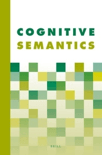
Cognitive Semantics
Decoding Language Through Cognitive LensesCognitive Semantics, published by BRILL, is a leading academic journal dedicated to the intricate study of cognitive processes underlying language use and semantic meaning. With its ISSN 2352-6408 and E-ISSN 2352-6416, this journal contributes significantly to the fields of linguistics and language studies, reflecting its importance in contemporary research on cognitive linguistics. Over its publication span from 2015 to 2024, it has established a niche as a Q3 ranked journal in the Linguistics and Language category for 2023, showcasing its relevance and growing influence in the academic community. Although currently not open access, the journal aims to provide a robust platform for exchanging ideas, theories, and methodologies related to cognitive semantics, fostering interdisciplinary dialogue among researchers, professionals, and students. Readers can expect to uncover valuable insights into the cognitive mechanisms that shape our understanding of language, making this journal an essential resource for anyone involved in linguistic research.
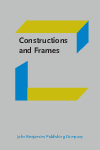
Constructions and Frames
Pioneering insights into the mechanics of language.Constructions and Frames, published by JOHN BENJAMINS PUBLISHING CO, is a prominent academic journal dedicated to the exploration of linguistic constructions and the frameworks that underpin language use. Established in 2009 and set to converge through 2024, this journal plays a crucial role in the field of Linguistics and Language, boasting an impressive 2023 Scopus ranking that places it in the 74th percentile among its peers. With a Category Quartile of Q2 in Linguistics and Language, it serves as an impactful resource for researchers, professionals, and students interested in advancing their understanding of language structures and cognitive aspects of linguistics. Although the journal is not Open Access, it offers a wealth of high-quality, peer-reviewed articles that contribute significantly to ongoing debates and innovations within the discipline. Join a vibrant community of scholars and stay informed with the latest research and theoretical developments by engaging with Constructions and Frames.
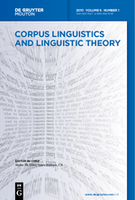
Corpus Linguistics and Linguistic Theory
Unveiling language patterns through innovative corpus analysis.Corpus Linguistics and Linguistic Theory, published by DE GRUYTER MOUTON, is a premier academic journal dedicated to advancing the interdisciplinary field of linguistics through the lens of corpus-based research methodologies. With an ISSN of 1613-7027 and E-ISSN 1613-7035, this journal is a valuable resource for linguists, researchers, and students who aim to investigate language structures, usage, and their theoretical implications. Recognized as a Q1 journal in the realm of Linguistics and Language, it boasts impressive Scopus rankings, positioning it within the top 7% and 8% of its categories in the Arts and Humanities and Social Sciences, respectively. Its relevance is underscored by a commitment to publishing rigorous research from 2005 to 2024, addressing contemporary advancements in linguistic theory fueled by empirical data. While the journal is not open access, it remains an essential platform for disseminating high-quality scholarship that informs both theoretical perspectives and practical applications in linguistics. As such, Corpus Linguistics and Linguistic Theory plays a crucial role in shaping the future of linguistic studies, making it indispensable for anyone engaged in this dynamic field.
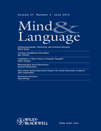
MIND & LANGUAGE
Exploring the Interplay of Thought and ExpressionMIND & LANGUAGE, published by WILEY, is a premier academic journal that has established itself as a leading platform for interdisciplinary research at the intersection of linguistics, philosophy, and cognitive science. With a noteworthy impact factor and a remarkable ranking in the top quartiles (Q1) for both Linguistics and Language as well as Philosophy, it reflects the journal’s robust contribution to the academic community, garnering attention from researchers and scholars worldwide. Since its inception in 1986, MIND & LANGUAGE has provided an avenue for exploring the complexities of language perception, cognitive processes, and the philosophical implications of linguistic studies. Its comprehensive scope ensures that it remains a critical resource for professionals and students alike who are engaged in the exploration of language's role in human thought and society. The journal's rigorous peer-review process guarantees the high quality and scholarly integrity of the published work, making it an essential addition to any academic library.

REVUE DE LINGUISTIQUE ROMANE
Pioneering Research in Linguistics and CultureREVUE DE LINGUISTIQUE ROMANE, published by the esteemed SOCIÉTÉ LINGUISTIQUE ROMANE, is a prominent academic journal dedicated to the exploration of Romance linguistics. With its ISSN 0035-1458, the journal plays a significant role in advancing knowledge within the fields of linguistics and the history and philosophy of science. Although it does not currently offer Open Access, it provides critical insights and peer-reviewed research that are indispensable for scholars, educators, and students interested in the nuances of Romance languages. The journal, which has seen converged coverage from 2006 to 2017, and then again from 2019 to 2021, is ranked in the third quartile (Q3) across various categories within Scopus, reflecting its established presence in the academic community. As a vital resource for interdisciplinary studies, REVUE DE LINGUISTIQUE ROMANE is instrumental for those seeking to deepen their understanding of linguistic structures, cultural nuances, and the historical development of Romance languages.